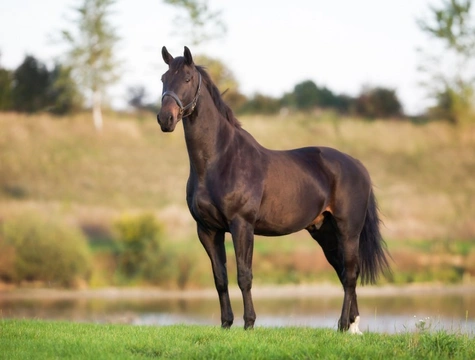
Omega 3 Supplements Can Benefit Horses with Lower Respiratory Diseases
Respiratory problems and in particular lower airway diseases are all too common in horses which can be put down to them spending more time stabled in a dusty environment. However, dusty feed can contribute to the problem too which means ensuring hay and bedding is as dust-free as possible when horses need to stand in.
Two Common Lower Respiratory Disorders
Two of the most common are recurrent airway obstruction and inflammatory airway disease which can really set a horse back when they are in training. New studies have shown that by supplementing a feed with omega-3 fatty acids, it can help reduce the symptoms of these debilitating respiratory conditions. Research carried out in the States showed that horses with lower respiratory issues when fed an algae-based supplement that contained good levels or omega-3 fatty acids, showed a marked improvement in their breathing in a relatively short space of time. The supplement used in the studies also contained MSM, Vitamin C together with a mushroom complex.
Algae provides a rich source of docosahexaenoic acid (DHA) which the studies showed helped horses that were already suffering from RAO (recurrent airway obstruction). Improvements were seen in their condition at the end of a 4 week period which researchers found quite surprising. However, horses taking part in the study were not given any hay, but rather a pellet-based feed as a way to reduce dust levels during the research.
As previously mentioned the researchers were surprised at the speed with which a horse's condition improved once the algae-based supplement was added to their feed and that within 8 weeks their breathing had improved to such an extent they came to the conclusion that adding the supplement to a horse’s diet was extremely beneficial especially if they suffered from either RAO and IAD although living in a dust-free environment and being fed dust-free hay and hard feed was still considered a must too.
The Benefits of Omega-3 Fatty Acid
Whether you use a fish-oil based or an algae-based supplement which is vegetarian, the benefits of adding it to a horse's diet are tremendous especially for horses in heavy work and performance horses. The reason being that omega-3 fatty acid helps reduce blood pressure due to its anti-hypertensive properties. It also helps fend off autoimmune diseases and has been seen to be very beneficial when given to mares in foal.
Horses in training have a lower heart rate than horses that are not given the supplement. Together with this their levels of insulin, serum cholesterol and plasma glucose were that much lower too. The only real difficulty many owner tend to have is that horses don't like the smell of fish oil and as such it would be better to supplement their feed with an algae-based one instead. Omega 3 fatty acid also helps maintain a strong immune system which means a horse has a better chance of fighting off infections. The supplement also helps protect their ligaments and joints. As previously mentioned, horses that suffer from any sort of lower respiratory issue can benefit from being fed a supplement containing omega-3 fatty acids too.
Other benefits of adding omega-3 fatty acid to a horse's feed include the following:
- It supports a horse's gastrointestinal system
- Helps reduce any sort of skin allergy a horse may be suffering from
- It is thought to help calm nervousness in horses
Best Sources of Omega-3 Fatty Acid
Apart from fish oil and algae, omega-3 can be found in fresh grass, but this is not the same as omega-3 fatty acid which a horse is unable to produce and which has to be added to their diet which is Alpha Linolenic Acid (ALA). Horses can produce two other sorts of omega-3 which are docosahexaenoic acid (DHA) and eicosapentaenoic acid (EPA) themselves.
Other sources of omega-3 which are often given to horses are flax seeds and chia seeds although fish oils tend to be higher in DHA and EPA, but they lack ALA which is essential. As such adding flax or chia seed solves this problem, although the new studies show that an algae-based supplement could be the better choice simply because it is vegetarian and therefore a more natural thing for horses to digest.
Another very valuable source of omega-3 fatty acid is found in fenugreek seeds with the advantage of them being a great source of vitamin A and D as well as many minerals. Fenugreek seeds have a very similar composition as that of Cod Liver Oil which is another very good source of omega-3 fatty acid. If your horse will not touch a feed with cod liver oil in it adding a small amount of Fenugreek seeds before adding the recommending manufacturer's dose to their daily rations could be the solution.
Conclusion
Supplementing a horse's feed with omega-3 fatty acid can help with lower respiratory disorders with recent studies in the States establishing that after a relatively short period of time, horses showed a marked improvement in their breathing. Performance horses and those that are in hard work can really benefit from being given the supplement. The good news is that if your horse refuses to touch any feed with fish oil added to it, by supplementing it with an algae-based product it provides the same if not better levels of omega-3 fatty acid and the other valuable omega-3s too.



